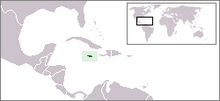LGBT rights in Jamaica
| LGBT rights in Jamaica | |
|---|---|

|
|
| Same-sex sexual activity legal? | Male and females are illegal |
|
Penalty:
|
Up to death by vigilante execution, 10 years imprisonment and/or hard labour |
| Gender identity/expression | None |
| Discrimination protections | None |
Lesbian, gay, bisexual, and transgender (LGBT) persons in Jamaica, particularly men, face legal and social issues not experienced by non-LGBT people. Sodomy and/or buggery are punishable with up to ten years imprisonment. On the other hand, sexual behaviour between women is legal.
Jamaica has been described by some human rights groups as the most homophobic country in the world because of the high level of violent crime directed at LGBT people. The United States Department of State said that in 2012, "homophobia was widespread in the country".
The government of Jamaica said in 2012 that it "is committed to the equal and fair treatment of its citizens, and affirms that any individual whose rights are alleged to have been infringed has a right to seek redress." The government also claimed that "there is no legal discrimination against persons on the grounds of their sexual orientation" and that it "is opposed to discrimination or violence against persons whatever their sexual orientation."
An assistant commissioner of police claimed just before he retired in July 2012 that Jamaica's reputation as homophobic was merely "hype" and that life for LGBT persons was improving. He suggested the real problem was gay-on-gay crime and members of the community cross-dressing in public.
Islands in the Commonwealth Caribbean adopted British buggery laws; however these laws were not as strictly regulated in the Caribbean as in the United Kingdom up until the Victorian era. Prior to this era, recounts were made of the island's British occupants engaging in sodomy, which may correlate with the fact that the first colonists were mostly men. The slave communities in Jamaica and the rest of the British Caribbean were made up of men and women from West Africa, the men being more sought after by slave owners, and historical analysis has been done to suggest that the religions and spiritual traditions of their West African communities allow room for male homosexuality.
In England, the Buggery Law of 1861 was repealed in 1967. By this point, Jamaica had already gained its independence in 1962, and thus its buggery law adopted from the British constitution, is still in force to this day.
Jamaica's laws do not criminalise the status of being LGBT but instead outlaw conduct. The Offences Against the Person Act (OAPA) provides as follows:
Section 76. Unnatural Offences. Whosoever shall be convicted of the abominable crime of buggery, committed either with mankind or with any animal, shall be liable to be imprisoned and kept to hard labour for a term not exceeding ten years.
...
Wikipedia
